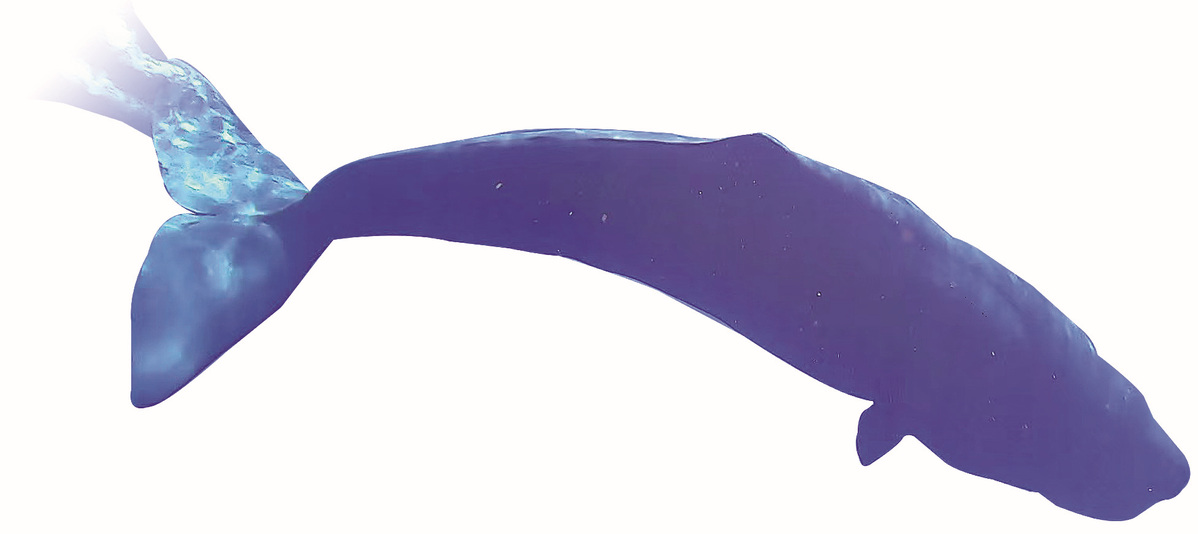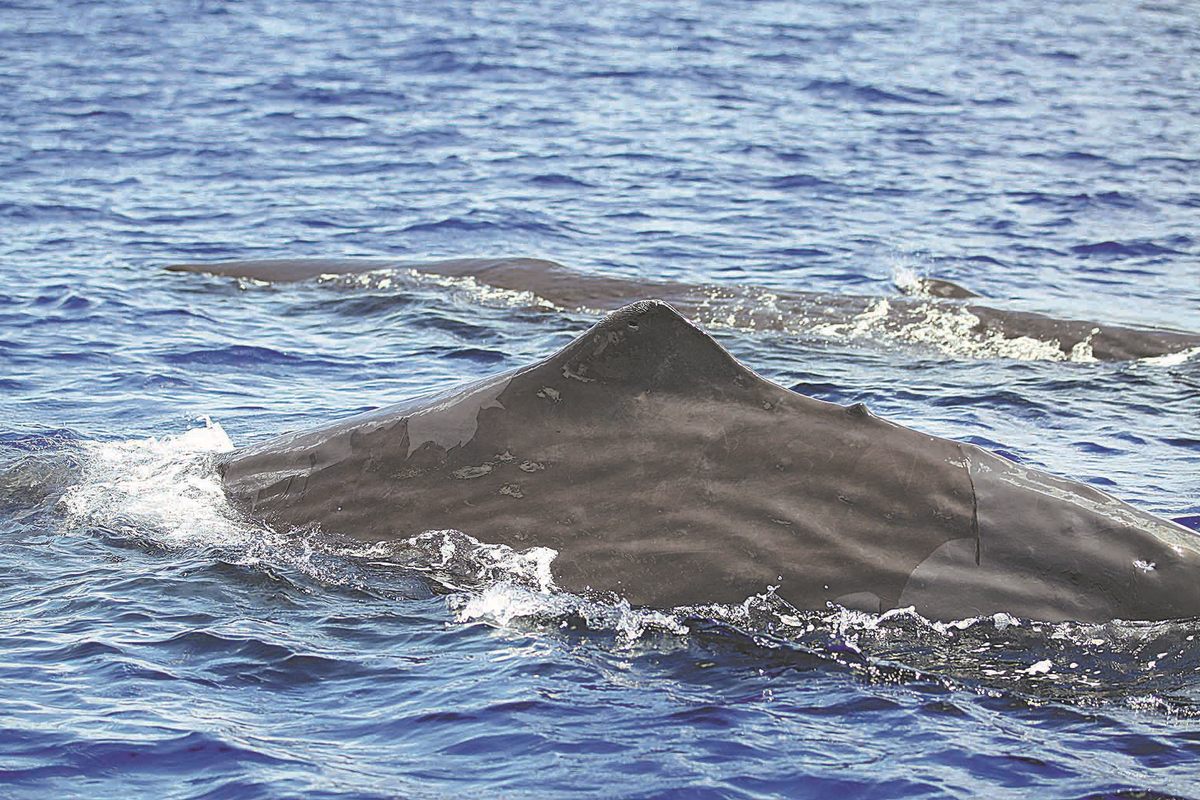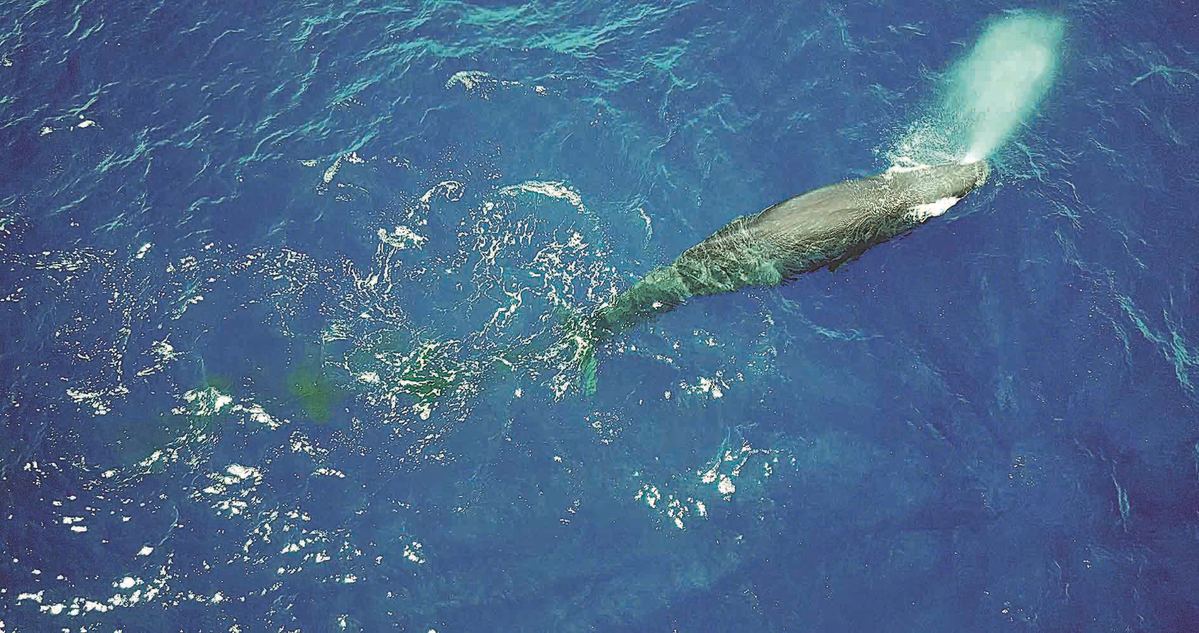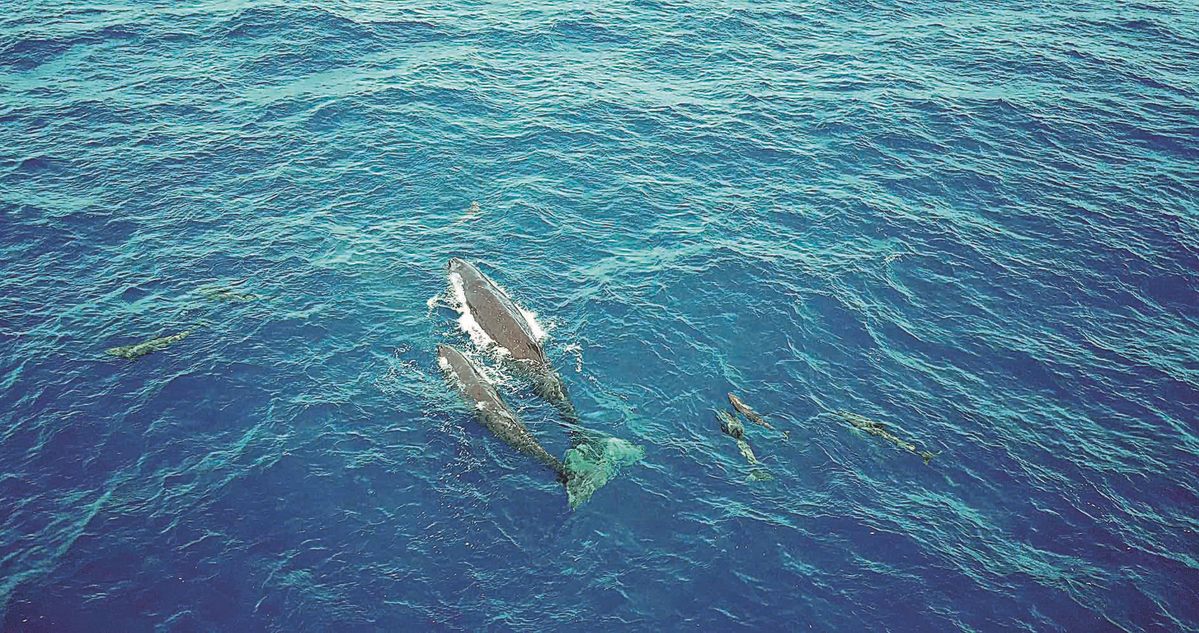

Nine groups of sperm whales have been sighted in northern areas of the South China Sea from 2019 to last year. Photo provided to CHINA DAILY
In many ways, Li Songhai is the direct opposite of Captain Ahab, the vengeful captain in Herman Melville's novel Moby Dick.
Unlike Ahab, who was obsessed with hunting a giant white sperm whale, Li is outgoing, optimistic and dedicated to studying and protecting these creatures in the South China Sea.
A researcher at the Chinese Academy of Sciences' Institute of Deep-sea Science and Engineering, Li leads one of the nation's deep-sea marine mammal research teams. He said the team comprises about 20 people who are "physically, mentally and spiritually tested" by the harsh conditions for oceanic expeditions in the South China Sea.
Li's team has found that there is a good chance that the South China Sea is a nursing ground for the endangered sperm whale-the largest toothed whale in the world, which can grow to more than 15 meters in length.
The team's findings were published in April in the journal Deep Sea Research Part I: Oceanographic Research Papers, the first time it had featured a study by Chinese scientists on marine mammals.
Li said: "These expeditions are not for the fainthearted. The weather is unpredictable, the ocean unforgiving, and it is difficult to eat or sleep in our small boat due to constant seasickness.
"When the weather is good, we stand for hours on deck with our cameras and binoculars, looking for signs of sperm whales and other marine creatures."
For Li, the biggest obstacle is not the hardships at sea, but the 1 million yuan ($148,930) needed for every deep-sea expedition. Each year, his team needs to find such budgets before the ideal "expedition window" of April to August closes. Conditions in winter are too perilous for such exploration.
Despite the challenges posed by the weather, a limited budget and a lack of equipment, Li said he is happy in his work.
"We are among only a small number of people performing this type of research in China. If we were to give up, our country wouldn't know what incredible creatures exist in the depths of the South China Sea. As a Chinese scientist, I cannot accept this," he said.
Studying sperm whales and other mammals in the South China Sea is of great scientific, ecological and strategic significance for China's conservation, management and development of deep-sea biological resources in the region, Li said.

Nine groups of sperm whales have been sighted in northern areas of the South China Sea from 2019 to last year. Photo provided to CHINA DAILY
Majestic discoveries
According to the team's study, nine groups of sperm whales were sighted in northern areas of the South China Sea from 2019 to last year. They were seen southeast of the island province of Hainan and north of the Xisha Islands. Each group comprised five to seven whales, and seven groups were found to be nursing one or two calves.
Li said that throughout history there have been reports of stranded sperm whales sighted in China's coastal provinces, but until now scientists have been unable to directly confirm that there are sperm whale populations in the nation's coastal waters.
"When I first saw a live sperm whale in the South China Sea in 2019, I couldn't believe my eyes at first," Li said. "The sight of a single whale is breathtaking enough, but several times we saw a mother whale swimming with her calf, accompanied by a group of Fraser's dolphins. This was a sight to behold."
While adult male sperm whales travel thousands of kilometers looking for food and mates, females with their calves do not follow suit. Li said that coupled with the fact that the South China Sea has ample food sources for sperm whales, it is highly possible that it is also a key hunting and breeding ground for the creatures.
"As these whales are such an essential part of a healthy marine ecosystem, China may need to optimize its policies related to marine ecological protection to shield these valuable creatures and other undersea resources from intrusive human activities," he said.
Li said such work includes enhancing marine biology research in the South China Sea and establishing a national marine protected area to safeguard waters around sperm whale nurseries-similar to marine protected areas in countries such as the United States, United Kingdom, Greece, Australia and Brazil.
"For many countries around the globe, the sperm whale has been a flagship creature for marine research and a poster child for marine conservation," Li said.
"This is because sperm whales are peaceful creatures that do not compete with humans for resources on land-yet they play a crucial role in the sustainability of the oceans that benefits all of us. This makes them truly altruistic friends of humankind."
From ancient folklore to children's cartoons, the sperm whale has long occupied a space in human imagination-cementing its reputation as an amazing predator by regularly hunting adult giant squid hundreds of meters below ocean surfaces.
A sperm whale produces ambergris in its intestine-a rare, solid and waxy substance that is the product of undigested squid. Ambergris, one of the most sought-after ingredients for luxury perfumes, sells for $10,000 to $50,000 per kilogram, depending on quality-earning it the nickname "floating gold".
Li said sperm whales carry a large amount of nutrients, especially nitrogen, from the depths where they feed, bringing these substances back to the surface in the form of excrement when they emerge from the water to breathe.
Such waste stimulates the growth of phytoplankton-plankton consisting of microscopic plants-which not only absorbs carbon dioxide to produce oxygen, but also provides food for a wide range of sea creatures and greatly improves the productivity and sustainability of fisheries, Li said. "The sperm whale is like a giant gardener of the ocean," he added.
Adult sperm whales can weigh more than 55 metric tons and live for over 70 years. Due to their immense size and long life expectancy, the whales play a key role in the global carbon cycle, Li said. Although female sperm whales are typically smaller than males, the adults can still grow to more than 10 meters and weigh 10 to 20 tons.
"When large marine vertebrates such as sperm whales die, their carcasses sink to the seabed, providing a rich source of food for deep-water creatures and creating a micro-ecosystem for the otherwise barren ocean floor," Li said. "This is known as 'whale fall', and has been dubbed 'the most romantic death', as it allows many creatures to thrive in some of the most inhospitable places on Earth."
As a result, the sperm whale has become the focus of global marine research and conservation efforts, Li said. In 1975, Connecticut in the United States even designated the sperm whale as its official state animal.

Nine groups of sperm whales have been sighted in northern areas of the South China Sea from 2019 to last year. Photo provided to CHINA DAILY
Protection needed
Commercial whaling in the 20th century severely reduced the sperm whale population. Today, about 300,000 of the creatures are roaming the oceans, making them a vulnerable species, according to the International Union for Conservation of Nature.
Li said, "Protecting the sperm whale is a global challenge, because the adult males can travel very long distances, and they are susceptible to threats posed by fishing, ocean and noise pollution, and collisions with vessels."
As there is insufficient data on the habitat and population of sperm whales in the South China Sea, more research is urgently needed to assess their living conditions and formulate conservation plans, Li added.
Meanwhile, it is important to optimize and properly manage fisheries and reduce overfishing in waters off China to save valuable food resources for sperm whales and other marine creatures, he said.
"Since the 1980s, China has made great progress in protecting rare and endangered species in coastal and freshwater environments, but for marine biomes (environments characterized by the presence of salt water) in areas that are deep and far from shore, there is a lack of relevant policies and mechanisms," Li said.
"Fortunately, China has attached greater importance to safeguarding deep-sea ecosystems in recent years, so protecting 'flagship animals' such as sperm whales may be a good starting point for the nation to expand its conservation efforts into the South China Sea."
Li added that if China established a model for conservation in the region, not only would it protect the country's valuable marine biological resources, including mammals, fish and reefs, it would also showcase the nation as a champion of marine biodiversity and ecological sustainability.

Nine groups of sperm whales have been sighted in northern areas of the South China Sea from 2019 to last year. Photo provided to CHINA DAILY
Essential role
The 14th World Oceans Day and 15th China Ocean Day were marked on June 8. According to the State Oceanic Administration, China has one of the world's richest marine biodiversities, with more than 28,000 recorded species. The nation also has over 50 national-level marine protection zones.
Wang Hong, head of the administration, said at a public event on June 8 that the ocean is the largest ecosystem on the planet, and plays an essential role in humanity's sustainable development.
He added that China will give equal priority to development and conservation when handling maritime resources, and will enhance innovation, international dialogue and cooperation, with the aim of becoming an ecological civilization that exists in harmony with nature.
Huang Hui, a noted coral reef expert and researcher at the Chinese Academy of Sciences' South China Sea Institute of Oceanology, said environmental protection is not just a matter for scientists and government agencies, but relates to everyone.
"Only by public involvement, and by taking one step at a time, can we build comprehensive protection for our ecosystem," she said.
Liu Haozhe, a volunteer at the Blue Ribbon Ocean Conservation Association, which was founded in Sanya, Hainan province, in June 2007, said: "The ocean is part of our home. How we treat nature will determine how nature treats us." (China Daily)

86-10-68597521 (day)
86-10-68597289 (night)

52 Sanlihe Rd., Xicheng District,
Beijing, China (100864)

